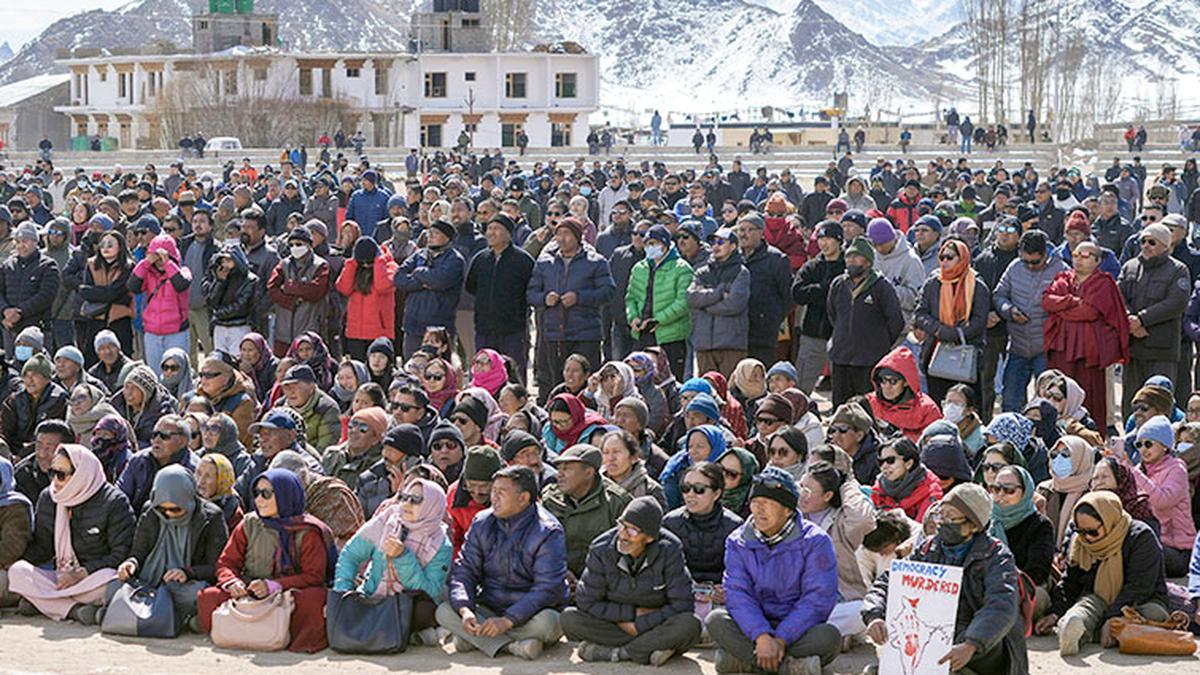A Deep Dive into the Policy Debate Surrounding Ladakh’s Domicile Rule
Ladakh’s political, economic, and social landscape has been evolving significantly since it became a Union Territory in 2019. The latest development in this transformation is the Ministry of Home Affairs (MHA) agreeing to review the legal aspects of the 30-year domicile rule, following continued discussions with Leh Apex Body (LAB) and Kargil Democratic Alliance (KDA).
The domicile rule debate is central to employment, land ownership, and governance policies in Ladakh. The region’s representatives seek stronger safeguards to protect local identity, employment opportunities, and autonomy. As the Union Law Ministry prepares to examine the proposal, many are eager to understand how this ruling could reshape Ladakh’s future.
What Is the 30-Year Domicile Rule & Why Is It Important?
The 30-year domicile rule proposes that an individual must have lived in Ladakh continuously for three decades to qualify as a permanent resident eligible for government jobs, benefits, and property ownership.
Key Concerns Behind the Demand
- Protecting Local Job Opportunities – Ladakh’s population is relatively small, and residents fear an influx of non-native applicants could reduce employment prospects for locals.
- Preserving Cultural Identity & Land Ownership – Many communities in Ladakh advocate for constitutional safeguards to prevent external influence on local traditions and resources.
- Preventing Unrestricted Migration – The 30-year requirement is seen as a way to prevent rapid population shifts that could impact Ladakh’s demographics.
Current Government Stance on Domicile
- The High-Powered Committee (HPC) reached a preliminary agreement that domicile status would require continuous residence from 2019 (a 15-year timeframe instead of 30 years).
- LAB and KDA members insist on a full 30-year requirement, and MHA has now agreed to legally review the feasibility of their demand.
The Political Implications of the Domicile Review
The HPC discussions indicate growing tensions between regional aspirations and national policies. While Ladakh’s leadership demands stricter domicile rules, New Delhi may consider alternative solutions balancing both local protection and national integration.
Possible Outcomes of the Legal Review
- Full Approval of the 30-Year Rule – If legally viable, this could establish strong safeguards for local employment and land ownership rights.
- Modification to a Shorter Timeframe – The government might propose a compromise, possibly reducing the requirement to 20 years.
- Gradual Implementation or Special Categories – An adaptive approach may introduce exceptions or phased eligibility criteria.
Employment, Governance & Economic Growth: What’s Next for Ladakh?
Beyond domicile policies, key issues affecting Ladakh’s future governance remain a priority.
Public Service Commission (PSC) for Ladakh
- The next HPC meeting will focus on establishing a separate Public Service Commission, ensuring local recruitment autonomy.
- Ladakh currently relies on UT-based recruitment, but a PSC could empower the region’s workforce.
Statehood & Sixth Schedule Inclusion
- While the 30-year domicile rule is a major concern, leaders remain committed to pressing for full statehood and constitutional safeguards under the Sixth Schedule.
- These measures would provide greater autonomy in policymaking and economic development strategies.
Understanding Domicile Policies: How Ladakh’s 30-Year Rule Compares to Other Regions
Domicile policies serve as legal frameworks that determine residency rights, employment eligibility, and land ownership protections. As Ladakh pushes for a 30-year domicile requirement, it’s valuable to compare this proposal with existing policies in other regions to assess its legal feasibility and potential impact.
Domicile Rules Across India: A Comparative Analysis
Different states and territories in India have varying domicile requirements, reflecting local governance priorities, employment needs, and cultural protection measures.
Key Examples of Domicile Policies
Jammu & Kashmir’s Former Domicile Rules (Pre-2019)
-
- Before the abrogation of Article 370, J&K had strict domicile laws preventing non-residents from purchasing land or holding government jobs.
- Residency requirements often spanned decades, similar to Ladakh’s current demand.
North-Eastern States (Assam, Nagaland, Mizoram, and Arunachal Pradesh)
-
- Many states have protective domicile policies, especially for tribal and indigenous populations.
- Nagaland’s Inner Line Permit (ILP) restricts external settlements, safeguarding local identity.
Himachal Pradesh & Uttarakhand
-
- Land ownership laws favor long-term residents.
- Government jobs prioritize locals, although some flexibility exists for economic integration.
Goa’s Domicile Policy
-
- Requires 15 years of continuous residence for government job eligibility.
- A shorter timeframe compared to Ladakh’s 30-year demand.
Legal Feasibility of the 30-Year Rule
Challenges in Implementation
-
- National policy alignment: The Centre may prefer a standardized rule rather than region-specific policies.
- Legal precedent: Most Indian states follow a 10-15 year domicile requirement, making Ladakh’s demand an exception.
Potential Compromises
-
- A phased implementation may gradually extend the requirement instead of an immediate 30-year rule.
- Special status clauses could allow Ladakh to adopt modified provisions under the Sixth Schedule.
Government Considerations
-
- The Union Law Ministry’s review will assess whether Ladakh’s demand aligns with constitutional principles.
- Public sentiment & political negotiations will likely influence the final decision.
What This Means for Ladakh’s Future
- If Approved: The rule would secure jobs & land ownership rights for long-term residents, preserving Ladakh’s unique identity.
- If Modified: A shorter timeframe (e.g., 20 years) could offer some protections while ensuring workforce inclusivity.
- If Rejected: Other policy alternatives, such as employment reservation or restricted land sales, may be explored.
The next HPC meeting is expected to provide further clarity, shaping Ladakh’s governance framework for decades to come.
Legal Challenges & Political Strategies Surrounding Ladakh’s 30-Year Domicile Rule
As Ladakh awaits the Union Law Ministry’s review of the 30-year domicile rule, several legal and political considerations could influence the final decision. Let’s break down the possible challenges, strategic negotiations, and implications that may arise from this policy discussion.
Legal Challenges: Can the 30-Year Rule Be Justified?
For the 30-year domicile rule to be legally implemented, it must comply with constitutional principles and existing residence laws across India. Several legal hurdles could make approval complex.
Does It Align with Fundamental Rights?
-
- Article 14 guarantees equality before the law, meaning domicile rules should not discriminate or unnecessarily restrict employment opportunities.
- The Supreme Court has historically favored inclusivity, ensuring job eligibility is not overly restrictive.
Will It Pass Legal Scrutiny?
-
- The Indian judiciary has previously struck down excessive residency requirements, citing employment and economic restrictions.
- Ladakh’s case will be carefully examined to determine if a 30-year requirement is legally excessive compared to other states with shorter residency terms.
Balancing Local Autonomy with National Governance
-
- While Ladakh demands stronger local rights, the Centre may aim for a middle-ground solution to preserve flexibility for non-residents interested in job opportunities.
Legal Precedent & Comparisons with Other Regions
-
- North-Eastern states have specific protections, but they operate under constitutional exceptions like the Sixth Schedule, which Ladakh currently does not have.
- Ladakh’s status as a Union Territory rather than a state could affect how domicile rules are applied differently compared to other regions.
Political Strategies: How Leaders Could Negotiate the Domicile Rule
Regional Mobilization for Stronger Autonomy
-
- The Leh Apex Body (LAB) and Kargil Democratic Alliance (KDA) are leveraging public support to reinforce their demand for stricter domicile protections.
- Petitions, mass movements, and leadership dialogues will play a crucial role in pushing their agenda forward.
Negotiating a Compromise with the Centre
-
- The Centre could offer a phased approach, reducing the 30-year requirement to 20-25 years while ensuring local job reservations.
- If full approval is unlikely, Ladakh’s leadership may negotiate alternative protections, such as employment quotas for residents.
Aligning with National Political Interests
-
- Any changes to domicile rules must fit within the broader framework of India’s employment policies and legal governance.
- Political representatives may engage in discussions to ensure Ladakh’s demands align with regional development priorities.
Implications & Possible Outcomes
- Full Approval of the 30-Year Rule – This would secure jobs & land ownership rights exclusively for long-term residents, protecting Ladakh’s identity.
- Modification to 20-25 Years – A compromise would ensure local protections while maintaining national inclusivity.
- Rejection & Alternative Solutions – If the rule is rejected, Ladakh may gain other policy safeguards, such as special recruitment rules or land sale restrictions.
The next HPC meeting will offer critical insights, shaping how Ladakh’s future governance and employment policies evolve.
Conclusion: Will Ladakh’s Demand for a 30-Year Rule Be Approved?
- MHA has acknowledged concerns, but legal feasibility remains uncertain.
- Upcoming meetings will clarify how domicile rules impact Ladakh’s workforce & governance.
- A strong legal framework could secure Ladakh’s unique identity, but political negotiations will shape the final decision.
With the Union Law Ministry reviewing the proposal, Ladakh residents eagerly await a verdict that could define the future of their home.



